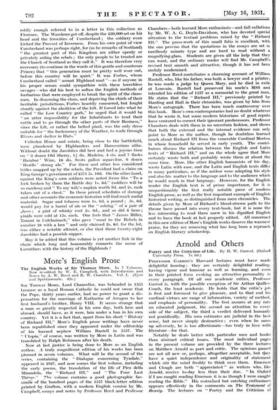More's English Prose
The English Works of Sir Thomas More. In 7 Volumes. Now re-edited. by W; E. Campbell,' with Introduction and . Notes by.A. W. Reed and R. W. Chambers. Vol. I. (Eyre and SpottiswoOde. 42s.) SDI THOMAS MORE, Lord Chancellor, was beheaded in ,1535 because as a loyal Roman Catholic he could not swear that
the Pope, thirty years earlier, had no power to grant a dis- pensation for the marriage of Katharine of Arragon to her
first husband's brother, Henry VIII. It seems strange that a man so greatly respected in his own day, both here and abroad, should have, as it were, lain under a ban in hii own country. Yet it is a fact that, apart from his short " History of Richard III," More's English prose writings haye never been republished since they appeared under the editorship of his learned nephew William Rastell in 1557. The
Utopia," of course, was written by More in Latin and was translated by Ralph Robinson after his death.
Now at last justice is being done to More as an English
author. A truly magnificent edition of his works has been planned in seven volumes. What will be the second of the series, containing the " Dialogue concerning Tyndale," appeared in -1927, and now comes the first volume, including
the early poems, the translation of the life of Pico dells Mirandola, the "Richard III," and " The Four. Last Things." 7.`be volume contains a good photographic fac- simile of the hundred pages of the 1557 black-letter . edition printed by .Grafton, with a modem English version by Mr. Vampbell, essays and notes by Professor Reed and Professor Chambers—both learned More enthusiasts—and full collations by Mr. W. A. G. Doyle-Davidson, who has devoted special attention to the textual problems raised by the " Richard III." The press-work of this small folio is excellent, with the one proviso that the quotations in the essays are set in needlessly minute type and are hard to read without a magnifying-glass. Students are given all the help that they can want, and the ordinary reader will find Mr. Campbell's revised text smooth and attractive, though it has not been unduly modernized.
Professor Reed contributes a charming account of William Rastell, who, like his father, was both a lawyer and a printer; he was made a judge by Queen Mary, and he died in exile at Louvain. Rastell had preserved his uncle's MSS and intended his edition of 1557 as a memorial to the great man. He states that the Richard III," previously printed by Harding and Hall in their chronicles, was given by him from More's autograph. There has been' much controversy over this book. More's own contemporaries had no doubt whatever that he wrote it, but some modern historians of good repute have ventured to correct their ignorant predecessors. Professor Chambers deals with them in no uncertain fashion, and shows that both the external and the internal evidence can only point to More as the author, though he doubtless learned much about Richard III from the venerable Cardinal Morton in whose household he served in early youth. The contri- butors discuss the relation between the English and Latin texts of " Richard III," and on the whole agree that More certainly wrote both and probably wrote them at about the same time. More, like other English humanists of his day, wrote Latin with ease, and the Latin and English texts differ in many particulars, as if the author were adapting his style and also his matter to the language and to the audience which he would reach in that language. However, for the English reader the English text is of prime importance, for it is unquestionably the first really notable piece of modern English prose, as well as the first important example of English historical writing, as distinguished from mere chronicles. The details given by More of Richard's blood-strewn path to the throne have passed into every text-book, but it is none the less interesting to read them anew in his dignified English and to have the book at last properly edited. All concerned in this new edition of More's English works deserve the warmest praise, for they are removing what has long been a reproach on English literary scholarship.


















































 Previous page
Previous page